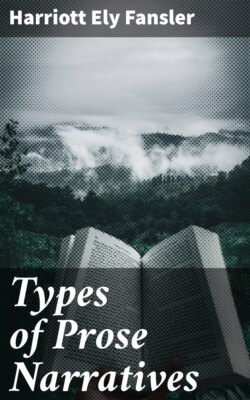Читать книгу Types of Prose Narratives - Harriott Ely Fansler - Страница 62
На сайте Литреса книга снята с продажи.
II. Parable
ОглавлениеTable of Contents
Parable contrasted with fable
The parable, like the fable, is a short didactic story; but the lesson of the parable is always spiritual, though not necessarily religious. The fable never rises above the common-place: it preaches a worldly morality. Self-interest and prudence are its tenets; it often satirizes; it laughs at mankind. The parable, on the contrary, is always serious: it is earnest and high in its purpose. It tries to win mankind to generosity and self-forgetting, or tries to shame him for his neglect by presenting good deeds in contrast with his, or tries to drive him forth to an awe-struck repentance by a representation of righteous anger.
The actors in a parable never violate the laws of nature. If animals appear, for instance, they do not talk. They follow as the friends or subjects of man, as in actual life. Man's dominion over them is spiritual; hence they may have a place in the parable along with him but not without him.
Characteristics of parables
Where the parable departs from the true story is in the fact that the men in the parable are types, and the deeds are symbolic. We have not Mr. John W. Richards, a particular farmer and an individual, plowing a field of corn in Mason County, Illinois, on July 3; but instead we have such statements as these: "The Farmer went out to plow his corn," "The Sower went out to sow the seeds," "A Householder hired laborers for his vineyard;" or "Once a King had two servants," or "The Prodigal sat among the swine in a far country." If the name of an actor is ever individual—like that of Abraham, for instance, in Franklin's prose parable, or Abou Ben Adhem in Leigh Hunt's poem—the actor himself is nevertheless representative. Abraham stands for the whole Jewish people in its exclusiveness; and Abou Ben Adhem, for all doubters who yet love their fellow-men. A character's seeing of angels or hearing of the voice of the Deity does not break the versimilitude of parables; for these matters are readily taken subjectively.
The spiritual truth of a parable is generally independent and separable from the story, which can always be read as narrative of actual events, though it is meant to be symbolic. The interpretation comes from without. It is either left to be inferred by the reader or is written before or after the narrative in the form of a summarizing figure of speech or a detailed collated exposition. You remember that Christ took his disciples aside and explained his parables to them.
Tolstoy
Count Tolstoy has written many parables. He combines his teaching with virile realism until he is as enthusiastically read as are the popular and less spiritual authors. "What Men Live By" is an exquisite example of his teaching, and, while it embodies a church legend, is a regular parable in form. It has the requisite generic atmosphere about it: the shoemaker and his wife, the rich purchaser, the kind foster-mother, and the children are all types. The intense realism comes in in the representation of Russian life. The lesson is given in an orderly exposition after the narrative of events is finished.
Suggestions on writing parables
In writing an original parable, one should avoid the diction of the Bible, that is, should avoid phraseology archaic or especially religious; but it would be well to imitate the simplicity and straightforwardness of the Biblical narrative. A modern parable writer to be successful would avoid mawkishness, and what is popularly designated as "preaching,"—but he would shadow forth nevertheless very clearly a high, spiritual truth. He would study living examples carefully so as to express inevitable actions in a few luminous words. There are many noble lessons to be taught by the actions of typical men in typical situations.
Working definition
The adjectives symbolic, serious, spiritual, typical, and natural might be embodied in a working definition thus: A parable is a narrative of imaginary events, a symbolic didactic story, wherein the actors are always types of men or types of men and animals (never exclusively of animals), and whereof the lesson is always spiritual, single, and separate, and the tone is always serious, and the events always appear natural and customary.
A list of proverbs that might be expanded into parables
1. God understands the dumb.
2. What a man acquires in his youth serves as a crutch in his old age.
3. Begin with small things that you may achieve great.
4. He who steals an egg will steal a horse also.
5. One can spoil the good name of a thousand.
6. One bad deed begets another.
7. The grandfather ate unripe grapes and the grandson's teeth were set on edge.
8. What is play to the cat is death to the mouse (modern, political parable).
9. When a man grows rich, he thinks his walls are awry.
10. Better lose one's eyes than one's calling.
11. What the wind brings it will take away.
12. No one is sure that his light will burn till morning.
13. The scornful soon grow old.
14. A merry heart doeth good like a medicine.
15. Love ever so well, there is also hate; hate ever so much, there is also love.
16. To rise early is not everything; happy are they who have the help of God.
17. By asking, one finds the way to Jerusalem.
18. When God gives, he gives with both hands.
19. Until you see trouble you will never know joy.
20. We are intelligence, that we may be will.
21. Act only on that maxim which thou couldst will to become a universal law.
